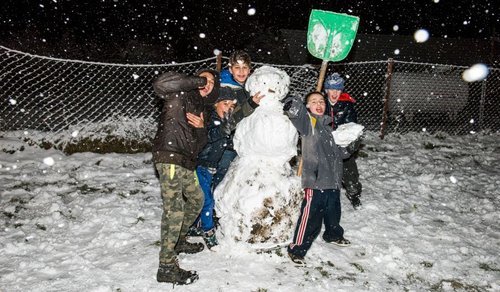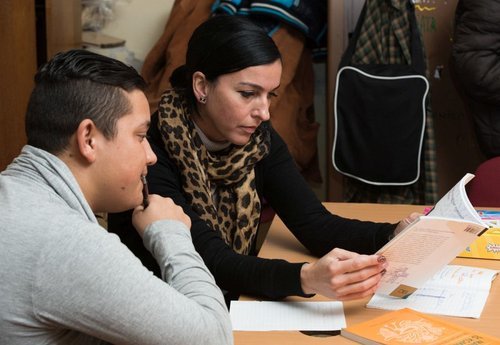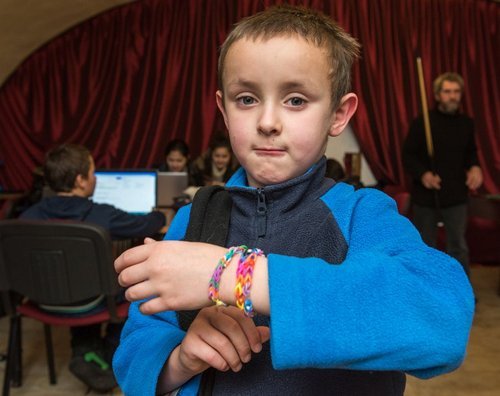Sheep of Pátka
2017. február 15., szerdaRoma and non-Roma children play together in a village where the adults are full of animosity. While people may lash out at one another outside, the church is a place of peace. The magical cooperation of civilian volunteers and the local congregation seems to almost be God’s answer to the prayers of the community: the “Sheep of Pátka” children’s home.
We arrived at the Reformed Church of Pátka in a heavy snowstorm, and when we entered the church’s garden through the back gate it felt like we had stepped into another world: the children and adults were chatting and playing happily, the young boys were building a snowman, and the teenage girls discussed what happened to them during the day. Roma and non-Roma children play together; there is no prejudice amongst them. “The relationship between the Roma and non-Roma adults is distant and distrustful. We hope that when these children meet again, 10 years from now, they’ll remember the times they played together,” says an employee at the children’s home.
At Pátka, a village of 1700 people in the Vértesalja Church Region, the school was closed a few years ago because the management decided it was better to separate Roma and non-Roma children. Now, the Sheep of Pátka children’s home is the only place for children between 6 and 18 to be together with their peers, Roma and non-Roma alike, and where they are cared for.

The institution is the joint project of the “Szabad Tér” Association of Kecskemét and the Reformed congregation of Pátka. Here children can play, try out craftsmanship, and even get the chance to visit a swimming pool or go on a day trip. The kids can spend four afternoons a week here and the volunteers organize skill-development games for them and try to create a healthy sense of community. Volunteers here aim to help the children develop both their strategic thinking and their ability to cooperate, as well as provide much needed structure, by teaching them that games can only be played if the rules are kept.
From happiness to learning
“The children’s home must work in a way that makes children happy. This is the only way we can get them to sit down and study,” says Gyula Csató, a social worker who helps with the program. “One of the children is paralyzed on his left side, and for a long time we always helped him hold the billiard cue, but then he realized he can support it with his left hand. Ever since then he always beats us at the game. The experience gave him hope that he can be successful in other fields as well, and nowadays when he comes, he brings his schoolbag with him.” According to teaching theory, providing these kinds of chances for success is one of the most important things for children in disadvantaged situations.
What’s natural for others should be natural for these children as well
The children’s home allows teenagers to do things that may seem mundane to their more privileged peers, but which are vital to the youth here, such as getting on Facebook. One of the teens told us that this is how she keeps in touch with her mother who no longer lives with them. Gyula Csató thinks that by experiencing social media and interacting with the wider world, the children of Pátka can feel like they are closer to their peers who live much more advantageous lives. “They can join in the interactions of a social network and it gives them self-esteem, makes them happy, and it’s easier for them to talk about their other needs,” she explains.
Immunity to shouting
There are other “unusual” things in the institution too. The adults are barely noticeable; rather than teaching in the usual way they mostly play alongside the children, and they also do not discipline the youth unnecessarily. “We give them freedom; we want them to – without overstepping a line – feel happy. We never raise our voice. If something happens that’s against the rules then we sit down and discuss it. These children are unmoved by shouting or aggression because they are used to it. What truly surprises them is when somebody talks to them calmly and listens when they talk back,” says the head of the children’s home.
They deserve to be able to choose
“We want them to be happy,” says the project leader. “What do we mean by that? We want them to have a choice in their future and not have to settle for a job that they hate, but have to do to survive, like people of poverty usually have to. Advancing in school is not the goal; it’s just the means for them to be able to continue their studies in a field that they wish to. Our day to day goal is for them to feel happy in a mostly functional community with an accepting atmosphere.”

Show me your palm
Guiding disadvantaged children can’t be done without creativity. Gyula Csató tells us about games that are based on Roma culture, but have a different meaning. “We often read their palms. They know it’s a game and enjoy it. Sometimes they show me their palm and I tell them: I see some kind of warning… did you study for tomorrow’s classes? Or This relationship could be dangerous, it’s too early for you to jump into it. This method helps us to get them to listen to advice they’d otherwise ignore.”
Visiting is a privilege
Almost all of Pátka’s Roma live in one street. “Before, there often were atrocities, but thanks to the children’s home the general tension has seemed to ease a little,” says Rita Grám, a volunteer at the institute. “In the beginning we thought there would be very few children, but we are close to overworked now – sometimes more than 30 children visit us in one afternoon. Children who’ve never sat down to do their homework come to us with their notes and they want to learn. Of course the system is faulty, by the afternoon they shouldn’t have to study, they should be able to play and enjoy themselves, but if they come to us, we’ll help them to learn. I’m proud that it’s a form of punishment at home for them to be not allowed to visit,” Grám says with a smile.
A relationship of trust
A mother living near the Roma neighborhood has been working with Roma children for 20 years. The children often visit their teachers on weekends as well – in most of their lives, these are the only adults they can share their problems with, says Katalin Móré. She explains that, “it took time until they started to trust others too, because they had so many awful experiences. They know that they can count on me, that I won’t run to my colleagues to gossip about the things they tell me. I accept them, and don’t want to force them to change, because I know it takes time.” Móré prefers to treat the children as friends, instead of pupils.
The antidote of fear
Treating them this way comes from the hearts, says another volunteer, Iván Hortobágyi. “Somebody who hates their neighbor cannot possibly love a stranger. The problem is that we don’t understand the culture of the Roma. I knew much less about them a year ago. We need to listen to them and learn from those with more experience in working with them. We can’t let the children grow up segregated. If they grow up together, they won’t be afraid of one another.” In talking about the long term goals of the program, Iván says, “We not only want a few children to get a degree or a good job, because most of them leave the village or even the country, we need people who stay here and show a good example for future generations.”
An answer to their prayers
The school was closed a few years ago due to conflict between the Roma and non-Roma community. The Reformed pastor wanted to care for the local Roma children for years. Even though the children now go to school in Székesfehérvár, he still organizes a Bible class for them and Roma and non-Roma children have joint performances in the church. The pastor wanted an after-school project to save what the village lost with the closing of the school. “The children are connected to life in Székesfehérvár. No one cared about them locally, and they don’t have an identity as the people of Pátka. What’s more, they are not getting the attention they deserve in the city, because they come from a village,” explains István Országh. Only schools can apply for after-school projects though, and there was no possibility for a children’s home at the time. “I started to pray, and then the phone rang. It was Iván and he asked if my congregation was interested in a children’s home, because their association was planning to apply for one. Our joint application won, and the institute started in the summer of 2013.”
A place of connection
“As a pastor, it would be a wasted opportunity to only look at the children’s home as part of the Roma mission. It’s more than that: children spend time here, together, and we can watch over them. A few years ago, there was no school here, and now our institution is here and professionals help them, guide them, and care about them,” says István.

An island of peace
The presbytery of the congregation had a huge discussion about the children’s home and then it stood behind the project as one. “We expected the fact that Roma appear in the congregation to be scandalous to some, and we also expected things to disappear. And yet, none of that happened: nothing was stolen, and there was no uproar – the place is like an island of peace. When people enter a pub the atmosphere is tense, the people are disdainful of one another. My conception is that a congregation and the church must be places of peace, and that, in itself, will do God’s work,” said István.
A corner for the children
Even before the children’s home, local civilians initiated a plan for a playground near the church that breathed new life into the wider community and the church itself as well. The pastor says that this, too, was God answering prayers. Restoration work has also started: there’s now a part in the church that’s specifically for the children. Speaking about how the church can function as a place of refuge, István says that, “if a child grows up near the church, they’ll have a connection to it. We don’t even need to have another goal but to make sure they feel happy here. And then, as adults, when they see that we have an event they won’t be afraid to join in and enter the church. I’ve met a lot of adults who felt alienated toward the church and I hope that these children won’t be like that.”
A wish for the congregation to think of the children’s home as their own
The plan is that, in time, the congregation won’t only be the place where the children’s home is; the pastor wishes to lessen the distance between the two. After gaining funding from the Swiss institute, HEKS, they have the chance not to just keep the children’s home, but to bring in more congregation members too. The result is that the congregation can contribute a lot to the place and mission amongst the children can have a bigger role. “We’d consider it a success if the congregation and the village considered the Roma children as a part of their community, and thus furthered the possibility of a long term, peaceful coexistence,” says István Országh.
Education started again
The Reformed people of Pátka dream of something even bigger – their long-term hope is for the school to be reopened. “We could start a second grade class, which is a miracle in itself.” The elementary school of the Reformed Church Region of Lovasberény has two classes in Pátka, where local Reformed teachers educate the children. “We had enough support to start the restoration of the school building, the new classrooms will be finished soon. We hope that in the future the children can once again learn together there,” István says excitedly.
Not avoiding the “others”
The congregation has an after-school project for Roma families and skill developing classes for kindergarten children. István hopes that one day the children’s home, the school, and the family after-school project can all be one. He says that, “today adults still avoid a lot of events because the ‘others’ are there too. In our community, the children could learn not to judge others immediately without knowing them.” It is this hope for a better future that keeps this ministry going.
Written by Ágnes Jakus
Photos by Tamás Füle
Published via Parókia, official website of the Danubian Reformed Church District
Translation by Melinda Kara
Contact us
Click here if you are interested in twinning.
Reformed Church in Hungary
Address: H-1146 Budapest, Abonyi utca 21.
PO Box: 1140 Budapest 70, Pf. 5
Email: oikumene@reformatus.hu
English, German and Korean language services in Budapest
Links
Recommended articles
-
Pastoral Letter in the Light of the Pandemic
Bishop Dr. István Szabó sent a pastoral letter of encouragement to the ministers serving in RCH’s congregations, expressing his gratitude for the persistence and creativity of the pastors.
-
RCH Joins in Pope's Call for Prayer
RCH published the call on congregations to join the initiative of Pope Francis, supported by ecumenical organisations, to unite in praying the Lord’s Prayer on Wednesday, 25 March, at noon.
-
English Speaking Worship Services Online
Each Sunday at 11 AM (CET) the St. Columba's Church of Scotland in Budapest, the international community of RCH invites you to join the worpship service on its facebook page.
-
Test of Humanity and Companionship
Reformatus.hu asked Dr. György Velkey, Director General of the Bethesda Children’s Hospital of RCH about the challenges of health care workers and ways of prevention against the pandemic.
-
All Church Events Suspended
In light of the coronavirus the Presidium of RCH requested congregations to suspend all church events with immediate effect. Beside restrictions, it calls for prayer, sobriety and responsibility.











